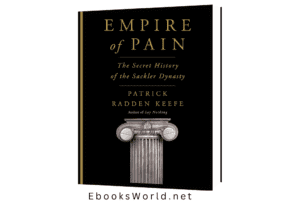Empire of Pain: The Secret History of the Sackler Dynasty

“Empire of Pain: The Secret History of the Sackler Dynasty” is a gripping and meticulously researched book by Patrick Radden Keefe that delves into the controversial history of the Sackler family, founders of Purdue Pharma, and their role in the opioid epidemic. The book spans several decades, exploring the rise of the Sackler fortune, their influence in the pharmaceutical industry, and the devastating impact of OxyContin on American society.
Background: The Sackler Family and Purdue Pharma
The Sackler family, originally from Brooklyn, New York, established themselves as philanthropists and art patrons. However, their wealth skyrocketed when three brothers – Arthur, Mortimer, and Raymond – became involved in the pharmaceutical industry. Purdue Pharma, founded in 1952 by Arthur Sackler, gained prominence with the release of OxyContin in 1996, a powerful opioid painkiller that would later be implicated in the opioid epidemic.
Rise of Purdue Pharma and OxyContin
Keefe meticulously traces the evolution of Purdue Pharma and its marketing strategies. OxyContin was aggressively marketed as a breakthrough painkiller with minimal risk of addiction. The Sacklers, particularly Raymond and later his son Richard, played a crucial role in promoting the drug, influencing doctors, and downplaying its addictive potential. The book illustrates how Purdue manipulated the medical community, regulators, and the public, contributing to the widespread overprescription of opioids.
The Opioid Epidemic Unleashed
As OxyContin prescriptions soared, so did cases of addiction and overdose. “Empire of Pain” explores the human toll of the opioid epidemic, sharing personal stories of individuals and communities ravaged by addiction. The book discusses how Purdue, aware of the growing concerns about OxyContin, responded with denial and continued aggressive marketing, contributing to the escalation of the crisis.
Legal Battles and Investigations
The Sacklers faced numerous lawsuits and investigations as the opioid crisis gained national attention. The book details legal proceedings, including Purdue’s 2007 guilty plea for misleading the public about OxyContin’s addictive nature. Despite fines and settlements, Purdue continued to profit, and the Sacklers remained shielded from personal liability.
Philanthropy and Public Image
Throughout the decades, the Sacklers maintained a carefully curated public image as benefactors of the arts and sciences. “Empire of Pain” explores how the family’s philanthropy, including prominent donations to museums and universities, served as a shield against scrutiny. The book delves into the ethical implications of accepting Sackler money, with institutions facing dilemmas over their associations with a family linked to the opioid crisis.
The Decline and Fallout
As the legal pressure intensified and public outrage grew, Purdue Pharma filed for bankruptcy in 2019. The Sacklers faced increasing criticism, and their reputation as philanthropists crumbled. The book examines the family’s internal dynamics, including disagreements over the handling of the crisis and the impact on their relationships.
Reflections on Accountability
“Empire of Pain” raises critical questions about accountability in the pharmaceutical industry, the role of regulatory bodies, and the ethics of wealth amassed from a product linked to widespread suffering. Keefe explores the moral responsibilities of the Sackler family, the pharmaceutical industry, and society as a whole.
Conclusion
In “Empire of Pain,” Patrick Radden Keefe provides a comprehensive and damning account of the Sackler family’s ascent to wealth, their role in the opioid epidemic, and the far-reaching consequences of their actions. The book combines investigative journalism, historical analysis, and personal narratives to create a powerful narrative that exposes the complexities and moral ambiguities surrounding the opioid crisis. It serves as a cautionary tale about corporate greed, regulatory failures, and the devastating impact of a pharmaceutical product on individuals and communities.







